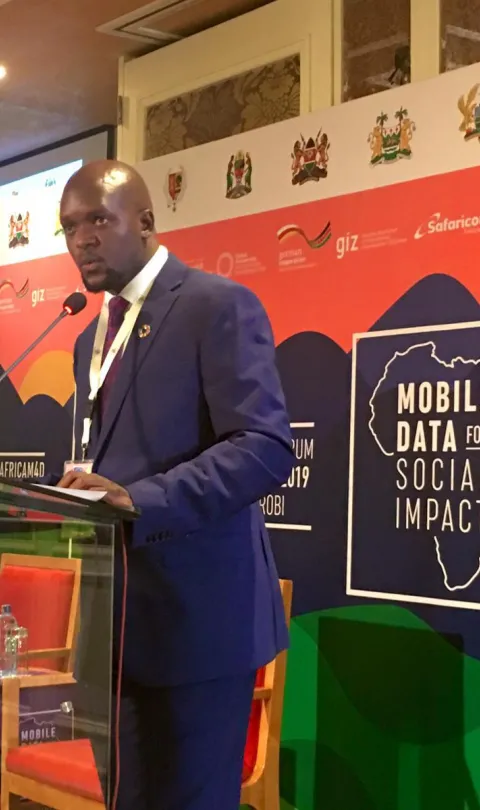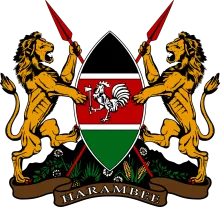Opening Remarks ‘Mobile Data for Social Impact’ 20 February 2019
Davis Adieno, Regional Director for Africa, Global Partnership for Sustainable Development Data
Introduction
Good morning. Habari gani. Excellencies, Distinguished members of the delegations of Ghana, Senegal, Sierra Leone, Tanzania and Uganda, honorable ladies and gentlemen, all protocols observed. I wish you all a warm welcome to what (at least from all indicators so far – for those of us who speak data lingo) is certain to be a memorable and enriching regional forum on Mobile Data for Social Impact. On behalf of the entire Global Partnership for Sustainable Development Data (GPSDD) family, I wish to express our sincere thanks to the Kenyan government, and in particular, the Office of the Deputy President for hosting us here. This gathering wouldn't have been possible were it not for the generous support of GIZ Kenya, Safaricom, Children’s Investment Fund Foundation, the Hewlett Foundation and other partners who’ve stepped up to shape the content.
Let’s start with a quick poll by show of hands- we call this ‘Citizen-Generated Data’. Who in this room has not yet checked their phone today? And it’s only 9am! Maybe you checked the traffic and decided to leave the house five minutes earlier, maybe you spoke to your friend or relative, or called the boss to say you’re stuck in traffic but you’re around the corner – when indeed you were crawling out of bed.
This activity is referred to as ‘digital breadcrumbs’- and that’s not only a reference to the fact that many of us skipped the gym and will be eating mandazi, samosas, and other pastries with us today instead.
The truth is that the world is full of patterns and cycles. We talk about cycles of poverty, seasonal migration, measles outbreaks. Agenda 2030 and the Sustainable Development Goals are about not accepting that these patterns are simply ‘the way it should be’. Why should you be poor because your parents were poor? Why should we have seasonal outbreaks of Ebola? Why should girls in rural communities face such difficulties to stay in secondary school? We are not fatalists, we are doers. That’s why we are here these two days – to explore how we can use anonymized mobile data to support the implementation and tracking of progress on the SDGs and achieve social impact.
The Global Partnership
The Global Partnership is a global network with partners drawn across governments, multi-lateral agencies, private sector, civil society, academia, and many others.
We emerged from a recognition that none of us can succeed in using data to achieve and monitor the Sustainable Development Goals without working together. In this time of great uncertainty and opportunity – there’s never been a larger gap between the best case scenario and the worst case scenario for sustainable development data. Many of you have expressed this eloquently and these two days we will hear from speakers of all sectors on how we can walk the dividing line between ‘misuse and missed use’ of privately held data, including that generated by mobile phones.
Five-Year Strategy
Our recently published five-year strategy captures the input of the 320 partners, the board and the technical advisory group. By supporting, working with, and bringing together our partners around our shared priorities, we believe that we will collectively achieve two, mutually reinforcing objectives: i) more and better data to monitor the SDGs, and ii) more and better data to achieve the SDGs. This collective approach is pretty simple and it is powered by people.
First we shut our mouths and open our ears. What are people telling us is a major barrier to success? Often, we hear the same issue expressed in different ways. Then we build consensus on the issues – this could be across the region, cross country working with ministries, departments and agencies.
Second we draw from the wisdom of the crowd to bring together some key organizations, which you see in action today. Our partners bring skills, knowledge, data and resources. Together we might from a data collaborative or commission research or ask development partners to support work on the topic.
Third, we reinforce progress by supporting changemakers, creating incentives, and capturing learnings on what does and doesn’t work.
And if that works collectively it feeds into what we all grapple with daily building global momentum to scale innovation, foster data systems that are interoperable and provide data that aligns with decision-making.
This last year we have used this approach on the Africa Regional Data Cube, launched and hosted here in Nairobi and used by Kenya, Ghana, Senegal, Sierra Leone and Tanzania. There are excellent use cases coming out of this and there remains a lot more work to do. Earth imagery is most powerful when combined with information about what we humans are doing down there. We’re excited by the potential of layering up this information to offer new insights – the country level work going on is tackling real world issues such as deforestation, climate resilience, waste management and urbanization.
Conclusion
When it comes to data for social impact it’s hard to talk about this stuff in the abstract. I therefore suggest that today we try as hard as we can to speak plainly, practically and give real world examples whenever possible. In September 2020 will the countries in this room be able to point to how they are using anonymized mobile network data to:
- See the direction cities are spreading in and plan bus routes to spur economic opportunities?
- Target vaccines to where they are most needed?
- Map population and settlement growth in between censuses?
- Direct public services to where they are needed most?
We know it’s possible, I look forward to hearing from all of you about what it will actually in practice take to get there. At the end of today we’ll have a cocktail reception to network, connect and reflect. I encourage you all to stay with us for these exciting two days, but most importantly actively participate. I wish you all very fruitful deliberations. Thank you.




